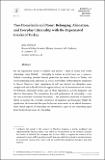Files in this item
‘Two homelands and none’ : belonging, alienation, and everyday citizenship with the expatriated Greeks of Turkey
Item metadata
| dc.contributor.author | Halstead, Huw Yiannis | |
| dc.date.accessioned | 2022-11-02T17:30:03Z | |
| dc.date.available | 2022-11-02T17:30:03Z | |
| dc.date.issued | 2022-10 | |
| dc.identifier | 281962778 | |
| dc.identifier | cfa897cc-1412-4f21-be0d-4a4befba14bf | |
| dc.identifier | 85141282871 | |
| dc.identifier.citation | Halstead , H Y 2022 , ' ‘Two homelands and none’ : belonging, alienation, and everyday citizenship with the expatriated Greeks of Turkey ' , Journal of Migration History , vol. 8 , no. 3 , pp. 432–456 . https://doi.org/10.1163/23519924-08030005 | en |
| dc.identifier.other | ORCID: /0000-0002-8788-4325/work/122215752 | |
| dc.identifier.uri | https://hdl.handle.net/10023/26293 | |
| dc.description.abstract | For the expatriated Greeks of Istanbul and Imbros – some of whom have Greek citizenship, some Turkish – citizenship is neither an irrelevance nor a panacea. Turkish citizenship provided limited protection for ethnic Greeks in Turkey, and Greek citizenship could only go so far to ease the burdens of their ultimate emigration to Greece. Moreover, their expressions of self and identity are altogether more complicated and malleable than the apparent fixity and dichotomousness of statism. Nevertheless, citizenship looms large in their experiences, in both pragmatic and affective dimensions. The acquisition, loss and performance of citizenship – even the very materiality of identity documents – are intimately connected to expatriate efforts to navigate the everyday experience of migration and belonging. Whilst the significance of citizenship thus goes far beyond mere words on an official document, these formal aspects of citizenship are nevertheless a part of, not something apart from, the lived experience of citizenship. | |
| dc.format.extent | 290934 | |
| dc.language.iso | eng | |
| dc.relation.ispartof | Journal of Migration History | en |
| dc.subject | Dual citizenship | en |
| dc.subject | Ethnic identity | en |
| dc.subject | Everyday life | en |
| dc.subject | Greece | en |
| dc.subject | Lived citizenship | en |
| dc.subject | Minorities | en |
| dc.subject | National identity | en |
| dc.subject | Turkey | en |
| dc.subject | DE The Mediterranean Region. The Greco-Roman World | en |
| dc.subject | JN Political institutions (Europe) | en |
| dc.subject | T-NDAS | en |
| dc.subject | SDG 10 - Reduced Inequalities | en |
| dc.subject | AC | en |
| dc.subject.lcc | DE | en |
| dc.subject.lcc | JN | en |
| dc.title | ‘Two homelands and none’ : belonging, alienation, and everyday citizenship with the expatriated Greeks of Turkey | en |
| dc.type | Journal article | en |
| dc.contributor.institution | University of St Andrews. School of History | en |
| dc.identifier.doi | https://doi.org/10.1163/23519924-08030005 | |
| dc.description.status | Peer reviewed | en |
This item appears in the following Collection(s)
Items in the St Andrews Research Repository are protected by copyright, with all rights reserved, unless otherwise indicated.

